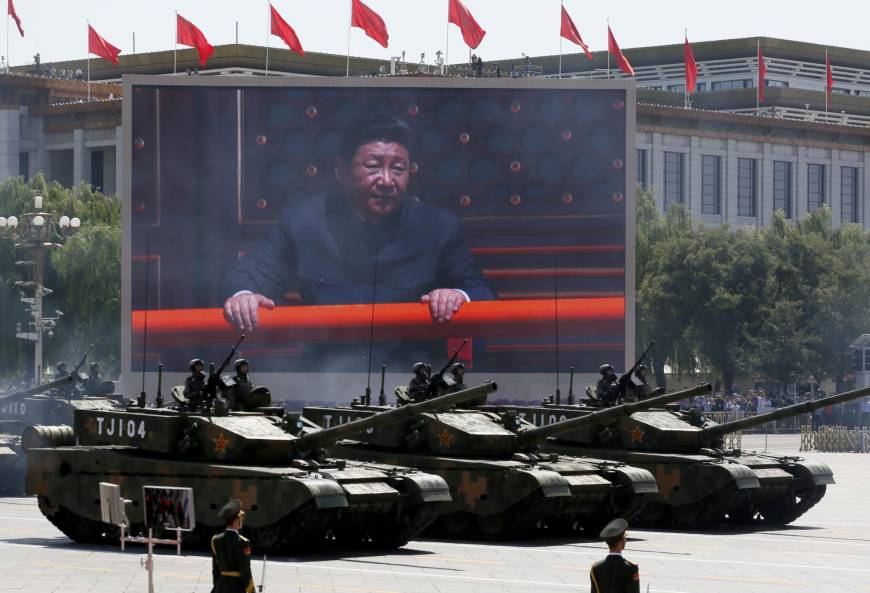Chinese military to join ‘unprecedented’ Russian joint exercises for first time

Chinese President Xi Jinping is displayed on a screen in Beijing in September 2015 during a parade commemorating the 70th anniversary of Japan’s surrender in World War II. | AP
China’s military will for the first time participate with Russia in massive joint exercises that are expected to be the largest war games since the fall of the Soviet Union as the U.S. rivals look to showcase their deepening ties.
The annual Vostok military drills will kick off late this month and run through mid-September, the Chinese Defense Ministry announced Monday. Military forces from the two countries will hold joint exercises at the Tsugol training range in Russia’s Trans-Baikal region, near where the borders of Russia, China and eastern Mongolia meet, from Sept. 11 to 15, the ministry added.
China will send around 3,200 troops, along with more than 900 pieces of weaponry and 30 fixed-wing aircraft and helicopters, to conduct strike and counterattack training, among other drills, it said.
“The drills are aimed at consolidating and developing the China-Russia comprehensive strategic partnership of coordination, deepening pragmatic and friendly cooperation between the two armies, and further strengthening their ability to jointly deal with varied security threats, which are conducive to safeguarding regional peace and security,” the ministry said.
“The military exercises are not targeted at a third party,” it added.
The drills will also include the Mongolian military.
The exercises will have an “unprecedented scale both in territory and number of troops involved,” Russian Defense Minister Sergei Shoigu said in a statement.
Shoigu said it would be the “largest event since the Zapad-81 maneuvers,” which saw between 100,000 and 150,000 troops take part in September 1981, according to the CIA.
The September dates announced by China overlap with the Russian-sponsored Eastern Economic Forum in Vladivostok. Chinese President Xi Jinping is among the leaders expected to attend this year’s version of the annual event, hosted by Russian President Vladimir Putin, and both leaders could make the trip to observe the joint drills.
In a commentary translated into English and posted to the Chinese Defense Ministry’s website Tuesday, an anonymous author noted the importance of closer Sino-Russian military ties.
“China’s participation indicates, to some extent, the subtle changes in its estimation of global landscapes,” the commentary said. “Especially considering the unscrupulous provocations in the South China Sea and on the Taiwan issue, China must prepare for the worst.”
Washington has blasted Beijing for building a series of military outposts in the contested South China Sea. Fearing they could be used to restrict free movement in the waterway, the U.S. has conducted a number of so-called freedom of navigation operations in the area, which includes vital sea lanes through which about $3 trillion in global trade passes each year.
Both countries have also clashed over self-ruled Taiwan, which Beijing, which views the islands part of its own territory, awaiting reunification. Although the U.S. does not have formal diplomatic ties with Taiwan, it is its most powerful ally and top arms supplier.
“China-Russia alliance against provocations is not meaningless,” Tuesday’s commentary said. “As the world situation evolves, China-Russia traditional friendship becomes increasingly important. After all, it is utterly unpredictable when their opponents will take actions.”
Alexander Gabuev, chair of the Russia in the Asia-Pacific program at the Carnegie Moscow Center, said Tuesday that Sino-Russia military ties have deep consequences for the West, the most immediate being the exports of sophisticated hardware like the S-400 air defense system and advanced Su-35 fighter to be used by China in hot spots like the South China Sea, Taiwan Strait and near the Japanese-controlled Senkaku Islands, which are also claimed by China, where they are known as the Diaoyus.
By lumping Russia and China together in last year’s U.S. National Security Strategy, “as well as by taking an “adversarial” approach to both Moscow and Beijing at the same time, “the U.S. is fueling rapprochement between the two. It’s symbolic, but starting to move beyond symbolism,” Gabuev wrote on Twitter.